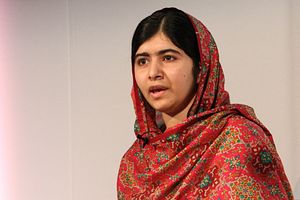Malala Yousafzai, a Nobel Peace Prize laureate and a vocal human rights activist, returned to Pakistan for the first time since being shot by Taliban militants in 2012. In an emotional speech that was telecast nationally, Malala said that “it has been my dream that I should go to Pakistan and there, in peace and without any fear, I can move on streets, I can meet people, I can talk to people.”
While Malala’s return back to Pakistan sends a positive and encouraging message that the security situation in the country has improved greatly, a large majority of Pakistanis believe that she works against the country’s interests has only maligned the name of Islam globally.
Her critics in Pakistan argue that she has not done anything significant to earn the fame and hype that she continues to receive globally. Moreover, conservative popular public opinion in Pakistan believes that the fact she is being promoted as a symbol of resistance for girls rights globally, there must be an “international conspiracy” to defame the country’s religious ideology.
After learning that she has arrived back to Pakistan, a number of private schools across Pakistan celebrated an “anti-Malala day” on Friday. Books have been published in Pakistan to condemn her image and the work she has done to promote the need for girl’s education globally, particularly in the developing and underdeveloped world. In response to Malala’s autobiography, titled I am Malala: The Girl Who Stood for Education and Was Shot by the Taliban, a publishing house in Pakistan widely printed a book, called I Am not Malala: I Am Muslim, I Am Pakistani: A Story of a Nation.
Another argument against Malala that has been put forward by the conservative segments of Pakistan society deals with how a number of other young Pakistanis have died in suicide bombings, mass violence, and facing other barbaric acts of violence while she ran away to have a privileged life. Nothing can be more sickening than having an opinion that equates nationalism with the death of innocent young lives and condemns survivors and denigrates their achievements.
Hatred against Malala should not come as a surprise in a country where national narratives are fueled by conspiracy theorists. Pakistan is a state where young children are taught to hate their fellow citizens because of their distinctive ethnic, ideological, cultural, and social backgrounds.
It’s a state where mainstream narratives are shaped in an environment that only promotes hatred, bigotry, paranoia, and objectifies women by reducing them to objects of possession. Dr. Abdus Salam, Pakistan’s first Nobel Laureate, was forced to leave the country because his countrymen thought his Ahmadi faith coupled with his accomplishments, which were termed an act of “conspiracy” too, threatened Islam and Pakistani nationalism. Above all, one should not be surprised about the outpouring of hatred toward a young girl in this country, whose founding fathers’ vision of a progressive, pluralistic, and democratic state has virtually no public support today.
Pakistanis hating Malala have never questioned the state’s policies that have mainstreamed violent attitudes in the country. Moreover they have never questioned with same vigor that why the state has failed to provide basic security, healthcare, good education, and, above all, an environment where diversity and acceptance proliferates rather than conservatism and hatred. Clearly, Pakistan’s mainstream narrative, which condemns Malala and a number of other true heroes that project the pluralistic and soft vision of the country’s founding fathers, is blindsided by the state’s decade’s long policies that only fuel radical attitudes and ideologies.
While the overall security situation of Pakistan has improved to a great extent over the last few years, the state still has a long way to go before the country becomes free of hatred and fanaticism. Addressing her critics and people who call her a Western agent, Malala in an interview said it best:
I don’t understand why they oppose me… I love Pakistan and I want a better future for this country… my focus is only working for the good, I do not even look at these comments.

































